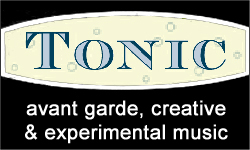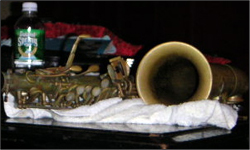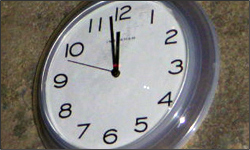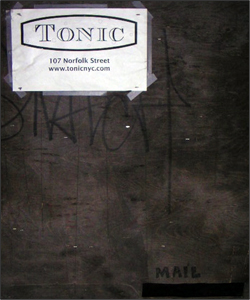TONIC |
|
It’s an extremely common occurrence: New York City music fans have strolled through the Lower East Side, searching for a small slice of experimental music heaven known as Tonic. Many have searched and searched only to end up scratching their heads and asking themselves, “Where the heck is this place?” The low key music venue that sits at 107 Norfolk Street in Manhattan is as unassuming as the empty parking lots near it. The building’s faded paint job and don’t-blink-or-you’ll-miss-it sign sum up the club’s no frills atmosphere and direct attitude. Tonic has existed since 1998 as one of the few New York City venues that can honestly say they’re about the music. However, the venue’s philosophy is not the best business model. In early February Tonic owners Melissa Caruso-Scott and husband John Scott realized one thing: If they could not come up with $100,000 in less than a month to repair wrecked plumbing and recover from surging rent their venue and second home would be closed. To elicit support for their club the Scotts booked the entire month of February as a series of benefit concerts with famous artists including Sonic Youth, Yoko Ono, and John Zorn. The club also took their quest online where they solicited contributions online for those unable to attend the shows. They even created an online testimonials page where patrons and performers could submit their own Tonic stories to rally support. What followed was truly unexpected: a torrent of financial and verbal support, and a successful revival of one of New York’s most unique music spaces. “It’s been a very hectic two months of fundraising,” said owner Melissa Caruso Scott. “Everyone has worked so hard to keep us going so now we are more motivated than ever.” Tonic is not the first club to suffer financial woe at the hand of poorly maintained property and rising real estate costs. The Bottom Line and the famous punk club CBGB’s have each faced immense debt, and in the case of The Bottom Line it did not survive. CBGB’s is currently struggling, facing an estimated $91,000 debt. The one question that has remained unanswered about the fact that Tonic has survived is, what makes this venue so special? Why did it succeed in staving off closure? “The kind of music we present is different than a large rock venue where each night it’s a different touring act,” said Scott. “Unlike bigger clubs, we have a community feeling. Musicians come to hang out and many musicians and fans have become good friends.” On Tonic’s website, hundreds of patrons have submitted their own answers to this very question, while others including online columnist Justin St. Vincent and Rob Schmieder of the New England Conservatory of Music submitted their thoughts in online interviews. “Tonic differs in that it appeals to a niche market subculture of music lovers who enjoy avant-garde and experimental music,” said Justin St. Vincent, Editor of the popular avant-garde music site www.xtrememusic.org. Rob Schmieder of the New England Conservatory of Music in Boston, Massachusetts agrees. “It just comes back to a very consistent booking policy – music lovers who followed the club closely believed it was a benchmark of quality in the area of music it has staked out – and that inspires loyalty,” said Schmieder via email. Tonic’s loyalty and love for its customers is reflected in its intimate set up and atmosphere. Musicians often emerge from the audience and famous jazz musician John Zorn even had his 50th birthday party at the venue. Tonic’s lengthy list of experimental and avant-garde artists has inspired many fans of these genres to take the club’s endorsement of an artist very seriously. “It’s the kind of club you don’t necessarily have to go to for it to make a difference. Sure, I went there to hear Lukas Ligeti when I knew nothing about him, but trusted Tonic not to waste my time,” said Schmieder. “I would also check out their listings every week just to see who was playing there. If those same names turned up here in Boston, I’d take them more seriously, just knowing that they had the “Tonic seal of approval”. As praiseful as fans have been, many on the website say improvements to the club can still be made. The club has already fixed their problematic plumbing, and rightfully boasts that the portapotty that was in place throughout February is no longer. Mr. St. Vincent, however, has a far more modest suggestion. “It desperately needs to acquire a real club sign. A piece of printed paper stuck above a rustic mailbox is a hilarious way of showing that this club actually exists down the alley near Essex Street,” he said. Owner Melissa Caruso Scott has already initiated some changes of her own. “We’ve had to do some things we wished we hadn’t. We now have a one drink minimum for all shows,” said Scott. “I consider myself in the music business, not in the bar business. Unfortunately, that’s not the best business model.” In the time since Tonic’s benefit series, veteran Tonic performer John Zorn opened a club of his own called The Stone. Scott said that she offers The Stone her full support and assured that Zorn would still perform at and frequent Tonic. Beneath all of this lies the simple fact that the Tonic “seal of approval” will continue to spotlight lesser known artists and famous musicians alike. That is if they can all manage to find their way there. |
|
References |
|
Interview Justin St. Vincent Rob Schmieder |
Online Information:TonicNYC.com: https://www.tonicnyc.com/PunkHardcore.com: CBGB’s May Be Forced To Shut Down: https://www.punkhardcore.com/news_details .cfm?EID=1758Gothamist: Melissa Caruso-Scott, Co-Owner Tonic: https://www.gothamist.com/archives/2005/03/18/ melissa_carusoscott_coowner_tonic.php |
Tonic Testimonials |
|
“Without Tonic, artists will be less likely to leave home for an East Coast tour.. Musicians will lose a place where they can connect with an audience that cares. And music lovers will lose a place where you can go to explore music you don’t know, because you trust the taste of the curator..” – Rob Schmieder, New England Conservatory of Music
|
 |
“Tonic is one of the greatest venues to experience avant-garde, experimental, and creative music in an intimate environment.. please continue supporting this incredible venue that has helped us open our eyes and ears to weird and wonderful music in all it’s various mutations.” – Justin St. Vincent, XtremeMusic.org |
Exclusive Interview (1) |
|
Paul Walker, New York journalist received responses to an e-mail interview with Rob Schmieder, Director of Communications, New England Conservatory of Music on April 5, 2005. Paul Walker: How and why is Tonic an important venue for you? Are there any specific memories or experiences you have had there that solidified it’s value? Rob Schmieder: “Avant garde, creative, and experimental music” – that’s Tonic‘s motto, and it clearly expresses what they’ve offered. For anyone who’s interested in following new directions in music, it’s really nice to have a compass that helps point you in those directions. I think WNYC has played that “compass” role for radio. Downtown Music Gallery is a record store that steers curious ears in progressive directions. These are just a few examples, and I’d lump Tonic in with them. It’s the kind of club you don’t necessarily have to go to for it to make a difference. Sure, I went there to hear Lukas Ligeti when I knew nothing about him, but trusted Tonic not to waste my time. Sure, I would walk by there late at night if I was in the neighborhood and sit in the parking lot for a while listening to whatever was coming through the wall. But I would also check out their listings every week just to see who was playing there. If those same names turned up here in Boston, I’d take them more seriously, just knowing that they had the “Tonic seal of approval”. Paul Walker: In light of other famous New York City venues being unable to stave off closure (Bottom Line, also CBGB’s facing large problems), what is it about Tonic as a venue that you feel elicited such vast support? What makes Tonic so unique that it was able to overcome what many clubs could not? Rob Schmieder: Maybe it just comes back to a very consistent booking policy – music lovers who followed the club closely believed it was a benchmark of quality in the area of music it has staked out – and that inspires loyalty. The “curatorship” approach that I believe was in effect at Tonic and that John Zorn has picked up at The Stone is important. If Dave Douglas books a month of trumpet players, as he did once at Tonic, I certainly don’t expect that they’ll all sound like Dave Douglas, but I do expect that they’ll all be interesting enough to keep a great musician’s attention – so they ought to be good enough for me. That’s a good enough reason to try to keep a club going. Paul Walker: Are there any suggestions or things you would like to see be done with Tonic in the future? Rob Schmieder: If Tonic can keep going more or less as they are – that’s great! It would also be great to see long-term financial/business stability for their operation, but there’s no simple answer to how to make that work. It certainly doesn’t help to be at the mercy of fluctuating rents in a neighborhood that is entering a high-stakes period of speculative real estate development, for example, the high-rises currently being built on the Lower East Side. If you go out to hear music in clubs a lot, you get used to hearing good music in clubs you hate as well as in clubs you like. It’s easier for concert halls to be “likeable” – they generally have a different business model, and there’s not all that pressure to pump bodies in and out of a liquor-selling machine to make the rent. After all, how can the music ever come first when it’s the booze sales that cover costs? I guess maybe the secret to a place like Tonic is that it feels more like a good concert hall and less like a bar. It’s the right size for the music being performed there, it feels like it’s in the right neighborhood, and they put the music first. In New York City, I go to hear music at Lincoln Center, Carnegie Hall, B.B. King’s, Irving Plaza, various churches, Fez, and Tonic – wherever the music I want to hear is being performed. Because B.B. King’s has some truly nasty security, I wouldn’t be sad if they closed, but I would hope someone else would pick up their interesting bookings. If Tonic closed, I’d miss the bookings as well as a venue that treats its visitors with respect. I don’t expect 95% of Tonic’s music to show up in a place like Lincoln Center, maybe wait twenty or forty years for that, by which time Tonic will have moved on to something else that is cutting edge. |
Exclusive Interview (2) |
|
Paul Walker, New York journalist received responses to an e-mail interview with Justin St. Vincent from Xtreme Music on April 5, 2005. Paul Walker: How and why is Tonic an important venue for you? Are there any specific memories or experiences you have had there that solidified it’s value? Justin St. Vincent: I believe that Tonic is the greatest live venue for avant-garde, experimental, and creative music! It has an intimate environment where an audience can really appreciate weird and wonderful music within close proximity to the musicians. Tonic is an important venue because it has provided a platform for talented players to perform their undiluted musical vision. Plus, plenty of great quality live recordings have been released from this legendary location in the lower-East side of New York City. My first experience at Tonic was seeing both sets of the avant-noise trio Hemophiliac, performing on September 1, 2003. This was the first performance in a month-long series celebrating John Zorn’s 50th birthday. I returned the next day to share a slice of Zorn’s cake with the close collection of people who were at Tonic on his actual birthday, September 2nd. Every time I have been passing through New York, I’ve catched a few shows at Tonic. It’s been a great venue for meeting music enthusiasts and sharing live experiences together. Tonic has also provided me with a good location to conduct interviews with some of the Downtown musicians, including Trevor Dunn, Carla Kihlstedt, Mattias Bossi, Shazhad Ismaily, Marika Hughes, and a perfect opportunity to meet musicians that I highly respect: Mike Patton, John Zorn, Joey Baron, and Marc Ribot. I’ve also been lucky to attend shows from Two Foot Yard, Elysian Fields, and Ratatat. My greatest and most memorial experience at Tonic was attending the entire New Years Eve 2003 showcase. Hemophiliac’s performance was the most intense live experience I have ever had the pleasure of attending. Tonic will continue to have a special place in my heart as being the venue that changed the way I enjoy and experience Xtreme Music. Paul Walker: In light of other famous New York City venues being unable to stave off closure (Bottom Line, also CBGB’s facing large problems), what is it about Tonic as a venue that you feel elicited such vast support? What makes Tonic so unique that it was able to overcome what many clubs could not? Justin St. Vincent: Tonic consistently had a great calender of live performances that was truly unique, something that other New York City venues did not cater for. I am also an advocate for the Blue Note jazz club who have always had the biggest names in the jazz world perform to a sold-out audience. Where Tonic differs is that it appeals to a niche market subculture of music lovers who enjoy avant-garde and experimental music. Although the Knitting Factory has had a brief flirtation with these music styles, it has never really had consistency in the acts that they book. Support for Tonic has been incredible because the music fans are loyal to the musicians that perform there. Prolific musicians like John Zorn have maintained great relationships through regular improvisation facilitated by performances at Tonic. It is those valued relationships between musicians that have made Tonic a legendary world famous live performance space. Paul Walker: Are there any suggestions or things you would like to see be done with Tonic in the future? Justin St. Vincent: Firstly, if the Tonic hasn’t done so already, it desperately needs to acquire a real club sign. A piece of printed paper stuck above a rustic mailbox is a hilarious way of showing that this club actually exists down the alley near Essex Street. Staff have always been friendly at Tonic and I’ve also enjoyed chilling out in the (sub)tonic on many occassions. I’m extremely pleased to hear that the venue has been able to raise enough money to keep it an active part of the Downtown Music community. I also anticipate seeing The Stone at some point in the future. I truly believe that The Stone has the right formula for a performance venue because it is entirely focused on the music. No drinks, no merchandise, just music. All the money raised from The Stone goes directly to the performing musicians. Also it’s great to have months curated by a different musician hand-picked by John Zorn. The Stone will continue to take the Downtown Music scene to uncharted musical terrain as once pioneered by Tonic. |






